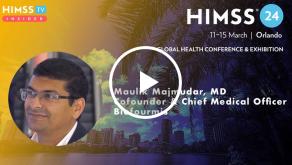The future holds more and bigger data - and demands better ways of managing it

Artificial intelligence and machine learning have huge potential as digital health continues to evolve. But experts speaking at this week's HIMSS Machine Learning and AI for Healthcare Digital Summit pointed out that AI and ML are built on a bedrock of data – and managing that data is a major endeavor, in and of itself.
"It's a very exciting time," said Jonathan Weiner, founding codirector of the Johns Hopkins Center for Population Health IT, during a leadership panel on Tuesday. "We've never had more data."
At the same time, "we can't lose sight of what we're here about. We're here to improve a person's health, a community's health," he said.
While AI and ML will be central to that goal, he said, "they become sort of a label for something much bigger, and that is the use, appropriately, of data of all types: the curation of the data, the collection of the data."
"The future holds more data – bigger data – and we need better integration [and] oversight, and we're going to find amazing ways to use that data," agreed moderator James Gaston, senior director of healthcare advisory services at HIMSS Analytics.
At Seattle Children's Hospital, where Ryan Sousa is the chief data officer, data starts to play a "really powerful role" when it's part of a patient's journey to health. As the team built out analytics, Sousa said, they were focused on making sure there was clear ownership of the data.
"In the early days, when the analytics was being done across the organization in a very distributed way, there was no single version of the truth," Sousa explained. "That was one of the things that was really getting in the way of Seattle Children's moving forward. So we needed to really get a handle on that."
The team established clarity on who would steward data sets. Ultimately, though, the team turned to Zeus – a data management framework it built and implemented that allowed them to ensure that every piece of data was "owned by somebody."
"With each data set you have data that's commonly available," said Sousa. "Then we have private, too … For each piece, we have complete visibility around how it's being used in the organization."
Investing in that framework, said Sousa, set the stage for ensuring the organization both had clarity around the sources and could create automation, build access to objects within the environment and potentially scale.
Both Sousa and Weiner also noted the importance of sharing data not just across a health system, but potentially on a community-wide level.
"The great challenge now is how we start to look at data across institutions," said Sousa. "For pediatrics, for a lot of this machine learning to really work, we don't have enough data on our own to find the signal in some of these very rare diseases. And so what we want is the ability to combine data across these different pediatric organizations."
Weiner urged attendees to consider the wide range of organizations patients will seek care from.
"As we all appreciate – particularly nowadays – medical care is only one-half, one-third of what it takes to keep people healthy," he said. "Just because you have data in the EMR does not mean it's complete medical care."
The future of data stewardship will undoubtedly require interoperability, frameworks, curation, management and collaboration between humans and computers to maximize the strengths of each, he added.
"I have never seen computer analytics do a better job than a combination of humans and computers," said Weiner. "As we develop the data, the human interactions, the human interfaces, are just as important – if not more – than advanced computer science techniques."
Kat Jercich is senior editor of Healthcare IT News.
Twitter: @kjercich
Email: kjercich@himss.org
Healthcare IT News is a HIMSS Media publication.
























